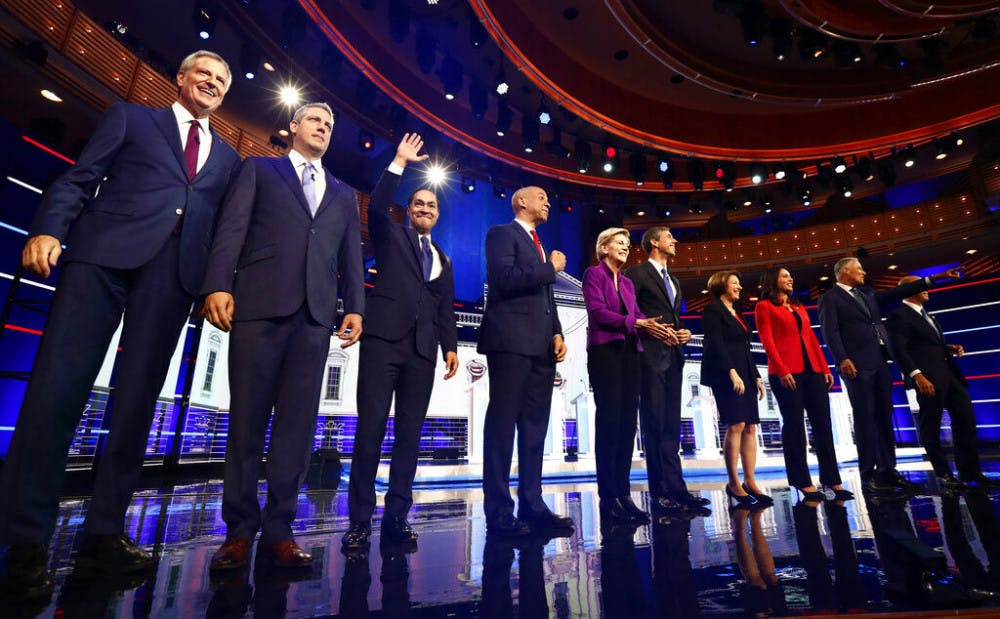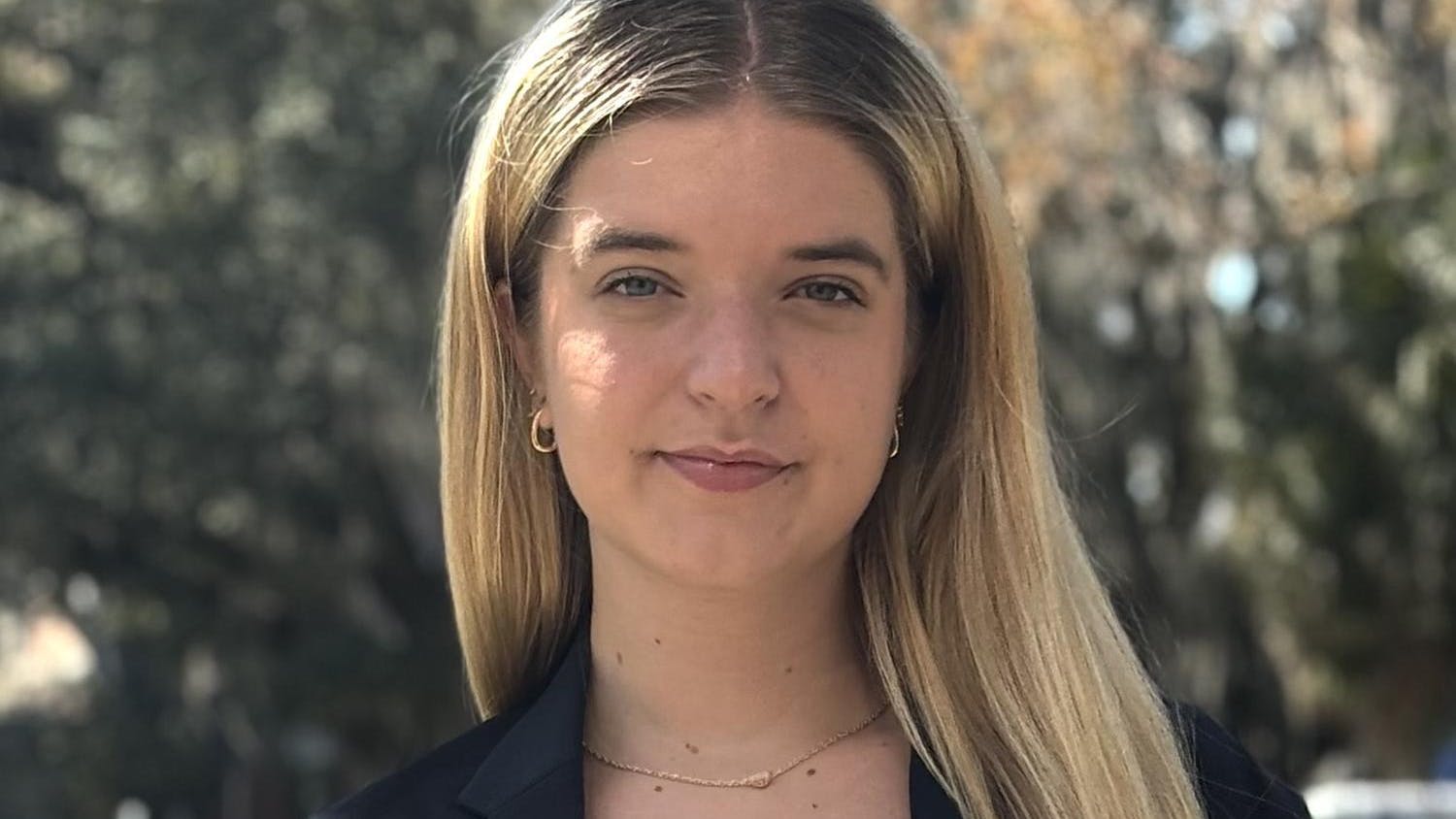Young voter turnout increased 16 percent from the 2014 to the 2018 midterm elections. As the U.S. gears up for another major election, candidates discuss issues that matter to a young electorate.
Twenty Democratic presidential candidates took the stage on Wednesday and Thursday in Miami to convince the country to vote for them during the primary. The candidates have diverse professional backgrounds including a mayor, representatives, senators and a former vice president.
Jarrod Rodriguez, a 20-year-old UF finance junior and the treasurer of UF College Republicans, believes it is too early to say which candidate will be the nominee.
"The most interesting thing about it to me was in the second debate, I think Kamala Harris really kind of shined and came out,” he said. “Joe Biden had a lead in the beginning. He was the front runner by a large margin."
Free college, college debt, climate change and gun control were issues that took center stage during the debates.
Minnesota Sen. Amy Klobuchar said she would work toward making community college free, helping low-income students attend college and increasing Pell Grants, a subsidy by the U.S. federal government for students who are eligible based on financial need.
“If billionaires can pay off their yachts, students should be able to pay off their student loans,” Klobuchar said.
Vermont Sen. Bernie Sanders believes in tuition-free public colleges and universities and the elimination of student debt. Sanders, who also ran in 2016, is known for his demand for increased taxation to pay for programs such as education and healthcare.
Not all candidates have identical stances, demonstrated by South Bend, Indiana, Mayor Pete Buttigieg’s position on college affordability. While he supports free college for low- and middle-income students, he believes the wealthy should have to pay.
“Yes, it needs to be more affordable in this country to go to college,” Buttigieg said. “It also needs to be more affordable in this country to not go to college.”
Rodriguez sees college as a time for students to invest in themselves, even if it involves taking on debt, for future success. The current presidential administration has created a good economy for college graduates, he said.
Eric Marsh, a 19-year-old UF economics sophomore and treasurer of UF College Democrats, believes the debates served as a good introduction to the Democratic presidential candidates, especially because they showed their commonalities and differences.
"I think generally the candidates who seem to approach it from a debt-forgiveness perspective are more associated with the left wing of the party whereas the moderates aren’t necessarily reluctant to address the issue, they just want to address it more so in terms of bringing down the cost for future generations,” Marsh said.
Democrats have an advantage on the UF campus, which UF College Republicans will try to address with activism and bringing speakers to its meetings, Rodriguez said.
“We’re going to work to elect Trump,” he said.
Climate change is a great threat to infrastructure and public health, with rising temperatures, droughts, heat waves, more intense hurricanes, sea level rise and melting ice.
Rejoining the Paris Climate Accord –– an international agreement aiming to end the rise in global temperatures — as well as instituting a carbon tax, holding oil companies accountable, limiting the use of fossil fuels and using renewable energy are some of the ways that the candidates discussed inhibiting further climate change.
“[College Republicans] definitely believe[s] that climate change is happening,” Rodriguez said. “My particular stance on this is that just because it’s happening, doesn’t mean anything follows from that, like in terms of what we should be doing or any policies.”
Marsh believes climate change will be a major platform point of the Democratic candidates.
“Even though some of the candidates are closer to the center, I think whoever the nominee is will show support for more aggressive action on climate change,” he said.
Combating gun violence was discussed during both debates, as it increases in importance with gun-related casualties in the U.S.
Marsh remarked on the differences in candidates’ positions despite them being from the same party. He remarked on California Rep. Eric Swalwell’s buyback policy and New Jersey Sen. Cory Booker’s desire for mandatory gun owner licensing.
“Definitely focusing on the differences like that between different candidates is important for college students,” he said.
Rodriguez said he thinks universal background checks for gun owners is a term that sounds good, but that it wouldn’t actually do anything to keep guns from those that shouldn’t own them.
“The College Republicans are in favor of gun rights and against most gun control measures that are being proposed right now at the federal level,” he said.
UF College Democrats has had a policy of not endorsing primary candidates since 2008, Marsh said. To prepare for the 2020 election, the organization will get its members familiar with voter registration, phone banking and canvassing.
“The probability is whoever the nominee is will have more experience in government than Donald Trump has,” Marsh said. “The nominee will definitely try to leverage personal characteristics like integrity, more civility and respect for the office than Donald Trump is putting forth right now.”
From left, New York City Mayor Bill de Blasio, Rep. Tim Ryan, D-Ohio, former Housing and Urban Development Secretary Julian Castro, Sen. Cory Booker, D-N.J., Sen. Elizabeth Warren, D-Mass., former Texas Rep. Beto O’Rourke, Sen. Amy Klobuchar, D-Minn., Rep. Tulsi Gabbard, D-Hawaii, Washington Gov. Jay Inslee, and former Maryland Rep. John Delaney pose for a photo on stage before the start of a Democratic primary debate hosted by NBC News at the Adrienne Arsht Center for the Performing Arts, Wednesday, June 26, 2019, in Miami.
Democratic presidential candidates, author Marianne Williamson, former Colorado Gov. John Hickenlooper, entrepreneur Andrew Yang, South Bend Mayor Pete Buttigieg, former Vice President Joe Biden, Sen. Bernie Sanders, I-Vt., Sen. Kamala Harris, D-Calif., Sen. Kirsten Gillibrand, D-N.Y., Colorado Sen. Michael Bennet, and Rep. Eric Swalwell, D-Calif., raise their hands when asked if they would provide healthcare for undocumented immigrants, during the Democratic primary debate hosted by NBC News at the Adrienne Arsht Center for the Performing Arts, Thursday, June 27, 2019, in Miami.






